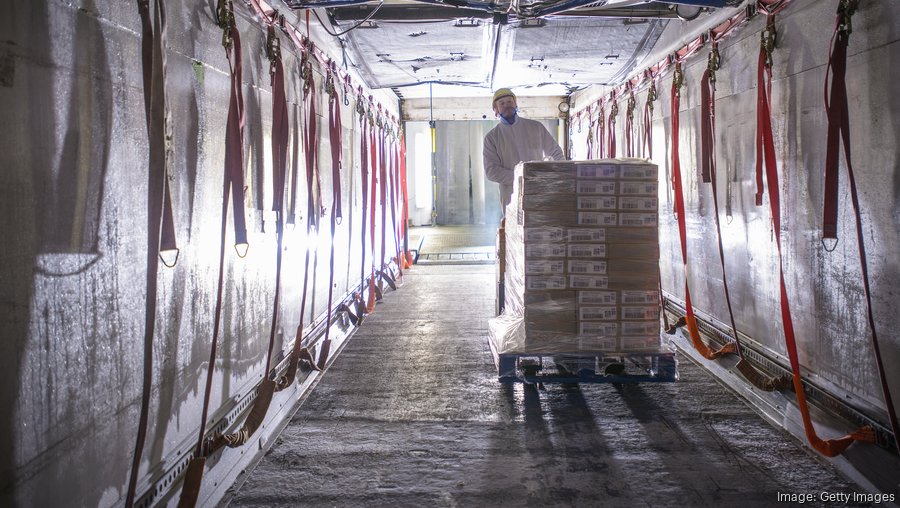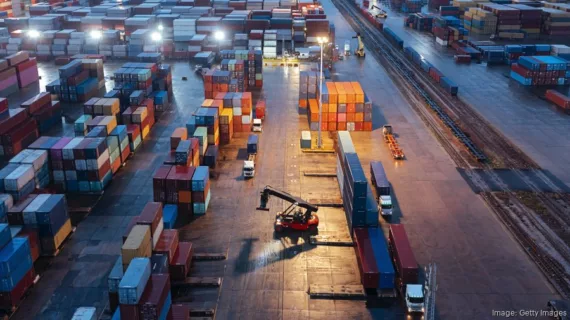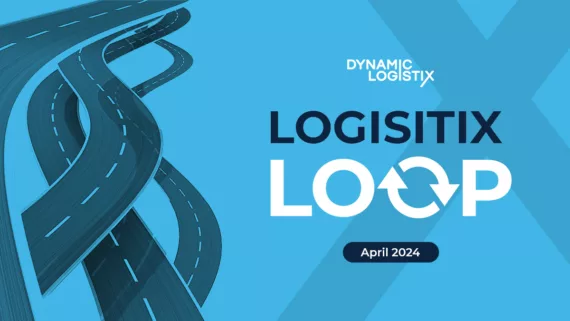Newsroom
For Immediate Release

3 Keys to an integrated, efficient, and reliable refrigerated shipping network.
By George Schergen – Vice President of Client Health, Dynamic Logistix
This story originally appeared in the Kansas City Business Journal.
Refrigerated shipping, or reefer shipping, is a sophisticated network of technology, infrastructure, and expertise dedicated to preserving the quality and safety of temperature-sensitive cargo. The transportation of goods in specially designed containers or cargo holds equipped with temperature-control mechanisms. These systems maintain specific temperature ranges, typically between -20°C to +30°C (-4°F to 86°F), depending on the cargo’s requirements.
Producers and exporters must carefully package their goods and ensure they meet regulatory standards for transportation. Proper packaging is essential for maintaining the cold chain, the uninterrupted series of temperature-controlled environments from production to consumption. According to Mordor Intelligence, The US Cold Chain Logistics Market is estimated at USD 78.45 billion in 2024 and is expected to reach USD 110.24 billion by 2029, growing at a CAGR of 5.83% during the forecast period (2024-2029).
So now that we know some of the requirements of this niche market and how big it is, what do cold chain shippers require to manage a successful operation?
Food grade carrier network
According to the Food Safety Modernization Act (FSMA) enforced by the FDA, transportation practices are a critical control point in preventing food safety risks, emphasizing the importance of employing carriers with suitable infrastructure and practices. Therefore, access to a food-grade carrier network is essential for shippers to uphold the integrity and safety of their products.
Vessels are equipped with state-of-the-art refrigeration units and monitoring systems to track temperature, humidity, and other environmental factors in real time. Advanced technology, such as IoT sensors and satellite tracking, provides invaluable insights into the condition of the cargo throughout transit.
Food and beverage shippers have an extremely thin margin of error, and any deviation from proper handling, storage, or transportation compromises the quality and safety of food products which could lead to financial losses, legal liabilities, damage to reputation, and, most importantly, harm to consumers. The competitive nature of the food industry means that shippers must maintain high efficiency and reliability to meet tight delivery schedules and customer expectations.
Visibility & Automation
Because monitoring the entire transportation process is vital for reefer shippers, visibility allows tracking the location and movement in real-time and allows you to anticipate potential delays or disruptions and take proactive measures to mitigate risks – like rerouting shipments or adjusting delivery schedules. Shippers who stay informed about the status of their shipments can minimize the chances of product spoilage and ensure timely deliveries to customers.
Additionally, a managed TMS provides visibility and real-time tracking help to maintain accurate records and reporting, helping customers understand accessorial charges like cost per pound; geographical regions that may cost more to ship to; expedited or time-sensitive deliveries; and fuel surcharges. Automated data entry of your shipment details (weight breakdown, number of shipments, shipment destination, etc.) into a TMS can improve your shipment strategy, consolidate your lanes, max out truck loads, minimize assessorial charges and improve shipment accuracy.
Support & Communication
The reality of unforeseen circumstances – equipment failures, temperature deviations, or delays – for reefer shippers is impossible to avoid. But to mitigate risks and minimize potential product spoilage, after-hours support can make a significant difference in the outcome of these potential challenges. Shippers who can quickly reach out to TMS providers for troubleshooting, guidance, and coordination of contingency plans are better prepared to address emergencies and keep shipments on track.
The supply chain doesn’t start on Monday at 9:00 a.m. and stop Friday at 5:00 p.m. In fact, many refrigerated shipments happen overnight and on the weekends. Having a dedicated support team that is available and accessible to answer questions and provide real-time information is invaluable. Bonus points if the support is a human being and not an automated service. A study conducted by Hiver found that 59% of support professionals emphasize a human-first strategy. “Even though AI can handle a lot of tasks quickly, it can’t fully understand human emotions or provide empathetic responses that a human can,” Nidhi Lohia, Senior Content Marketing Manager shared. “In situations where customers are frustrated or need a more personalized approach, human interaction is key.”
By leveraging advanced technology, robust infrastructure, and strategic partnerships, shippers can overcome the challenges of transporting temperature-sensitive cargo and delivering goods safely and efficiently to markets across the U.S. and around the world. As global trade continues to evolve, the importance of refrigerated shipping logistics in maintaining the integrity of the cold chain will only grow, driving innovation and advancements in the field.
The reality of unforeseen circumstances – equipment failures, temperature deviations, or delays – for reefer shippers is impossible to avoid. But to mitigate risks and minimize potential product spoilage, after-hours support can make a significant difference in the outcome of these potential challenges. Shippers who can quickly reach out to TMS providers for troubleshooting,
guidance, and coordination of contingency plans are better prepared to address emergencies and keep shipments on track.
The supply chain doesn’t start on Monday at 9:00 a.m. and stop Friday at 5:00 p.m. In fact, many refrigerated shipments happen overnight and on the weekends. Having a dedicated support team that is available and accessible to answer questions and provide real-time information is invaluable. Bonus points if the support is a human being and not an automated service. A study conducted by Hiver found that 59% of support professionals emphasize a human-first strategy. “Even though AI can handle a lot of tasks quickly, it can’t fully understand human emotions or provide empathetic responses that a human can,” Nidhi Lohia, Senior Content Marketing Manager shared. “In situations where customers are frustrated or need a more personalized approach, human interaction is key.”
By leveraging advanced technology, robust infrastructure, and strategic partnerships, shippers can overcome the challenges of transporting temperature sensitive cargo and delivering goods safely and efficiently to markets across the U.S. and around the world. As global trade continues to evolve, the importance of refrigerated shipping logistics in maintaining the integrity of the cold chain will only grow, driving innovation and advancements in the field.
George Schergen is the Vice President of Client Health at Dynamic Logistix.
Dynamic Logistix is a third-party provider of shipping and freight solutions that combines a world-class technology platform with stellar personal service. Our technology, our culture and our connections with shippers allows us to provide premium shipments to our carrier network.

End-to-end visibility changes the game for shippers, carriers
Companies across the supply chain have been laser-focused on improving their visibility options over the past several years. While most companies understand that visibility paves the way for increased efficiency and better coordination throughout the lifecycle of a shipment, many leaders in the space do not yet have a solid understanding of partial versus complete visibility.

Update on the State of Freight: April 2024
Insight into technology and labor trends, current rates and a new tax plan.

April 2024 Logistix Loop
From fragile ceramic mugs to heavy weight machinery, product shipments come in various shapes, sizes and weights. While not all freight requires the same handling for safe delivery, there are a few best practices shippers can implement to set up carriers for success when transporting their goods.

March 2024 Logistix Loop
Stay ahead of the competition with Logistix Loop, our new monthly series that informs you of the latest news and trends impacting the transportation and logistics industry. Navigate the intricate web of supply chains and transportation networks with Dynamic Logistix as your guide for applying new technology and positioning your business for success.

DLX Ranks No. 74 on Inc. Magazine’s List of the Midwest Region’s Fastest-Growing Private Companies
Inc. magazine today revealed that Dynamic Logistix (DLX) – a third-party provider of shipping technology and freight solutions – is No. 74 on its fourth annual Inc. 5000 Regionals: Midwest list, the most prestigious ranking of the fastest-growing Midwest private companies.




